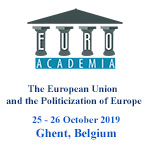Euroacademia Conferences
 Europe Inside-Out: Europe and Europeanness Exposed to Plural Observers (9th Edition) April 24 - 25, 2020
Europe Inside-Out: Europe and Europeanness Exposed to Plural Observers (9th Edition) April 24 - 25, 2020 Identities and Identifications: Politicized Uses of Collective Identities (9th Edition) June 12 - 13, 2020
Identities and Identifications: Politicized Uses of Collective Identities (9th Edition) June 12 - 13, 2020 8th Forum of Critical Studies: Asking Big Questions Again January 24 - 25, 2020
8th Forum of Critical Studies: Asking Big Questions Again January 24 - 25, 2020 Re-Inventing Eastern Europe (7th Edition) December 13 - 14, 2019
Re-Inventing Eastern Europe (7th Edition) December 13 - 14, 2019 The European Union and the Politicization of Europe (8th Edition) October 25 - 26, 2019
The European Union and the Politicization of Europe (8th Edition) October 25 - 26, 2019 Identities and Identifications: Politicized Uses of Collective Identities (8th Edition) June 28 - 29, 2019
Identities and Identifications: Politicized Uses of Collective Identities (8th Edition) June 28 - 29, 2019 The European Union and the Politicization of Europe (7th Edition) January 25 - 26, 2019
The European Union and the Politicization of Europe (7th Edition) January 25 - 26, 2019 7th Forum of Critical Studies: Asking Big Questions Again November 23 - 24, 2018
7th Forum of Critical Studies: Asking Big Questions Again November 23 - 24, 2018 Europe Inside-Out: Europe and Europeanness Exposed to Plural Observers (8th Edition) September 28 - 30, 2018
Europe Inside-Out: Europe and Europeanness Exposed to Plural Observers (8th Edition) September 28 - 30, 2018 Identities and Identifications: Politicized Uses of Collective Identities (7th Edition) June 14 - 15, 2018
Identities and Identifications: Politicized Uses of Collective Identities (7th Edition) June 14 - 15, 2018
EU Ordo-Liberalism and Anti-Systemic Movements: The Disruption Potential Combined
-
-

-
Presentation speakers
- Achim Alan de Merlo, The Graduate Institute, Geneva, Switzerland
Abstract:
In the Euroacademia Conference paper, I argue that the current political confronted situation between more Europe or less Europe, which is quite spread across the European Union, can be interpreted as a potential combination of systematic faults and social response uprisings. These two parallel, but interconnected processes, are dividing and escalating the gap between a European mainstream elite and the European citizens left behind along the neoliberal European integration process, as far as it is directed in a “dirigisme” manner from Brussels institutions. In this context, the behaviour of a “good European” does not necessarily means to become succumbed and annihilated by a conflicting and elitist oriented supranational idea of Europe.1 Well the contrary. As an historian, to better solidify and give a base to this socio-political evolution within the EU, I have considered at the core of this paper: Carl Schmitt thinking and Karl Polanyi great transformation theory on social economic factors. The reflection that comes out may be a limited exercise, but will be interesting to discuss further this argument. This is because from different sides we are hearing in the academic milieu that the current European settings are somehow a situation similar to the twenties, and the consequential social response of the thirties of last century. Furthermore, along these lines, even Karl Marx thesis on capitalism has been recently resurrected from dusty bookshelves. Predicting such critical situation to happen, anyway soon or later, in the development of liberal capitalism. However, without taking these statements for granted, as right or wrong, the reflection in the conference paper tries to present if such methodological approach is consistent enough to analyse the current situation across Europe today. In other words, if the situation presented by scholars and in particular in the media today reflects, per-consequence, a social-psychological transformation that Europe has already experienced a century ago. I also conclude in proposing a tentative possible solution to the problem of divergence and discontent that is currently locking the progress of European integration.
-
Related Presentations

European Social Thinking and the “Other”
- Dolores García

Does Liberalism Need a Bit of Despotism?
- Matteo Rategni













